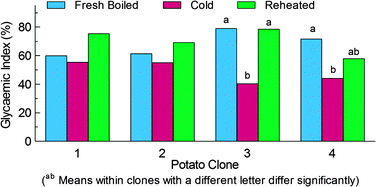Thomas Wolever and co-workers from Canada have studied the effect of preparation methods on the glycaemic index (GI) of novel potato clones designed to be low in GI. High GI diets are associated with increased risk  of diabetes and cardiovascular disease, due to the rapid release of carbohydrates into the bloodstream. While raw potato starch is resistant to digestive enzymes, cooked potato starch is easily digestible by enzymes and therefore has a high GI value (>70). Due to their high GI value, potatoes are often viewed as bad for our health.
of diabetes and cardiovascular disease, due to the rapid release of carbohydrates into the bloodstream. While raw potato starch is resistant to digestive enzymes, cooked potato starch is easily digestible by enzymes and therefore has a high GI value (>70). Due to their high GI value, potatoes are often viewed as bad for our health.
In this study, variations in the GI value were observed when the potato clones were cooked, cooled and reheated, and the extent of this also varied for different clones. The results could potentially help to create new varieties of potatoes with low GI values, which would be beneficial for the prevention of diabetes and cardiovascular disease.
To read the full article for free, click the link below:
Effect of preparation method on the glycaemic index of novel potato clones, Tara Kinnear, Thomas M. S. Wolever, Agnes M. Murphy, J. Alan Sullivan, Qiang Liud and Benoit Bizimungu, Food Funct., 2011, DOI: 10.1039/c1fo10042d










